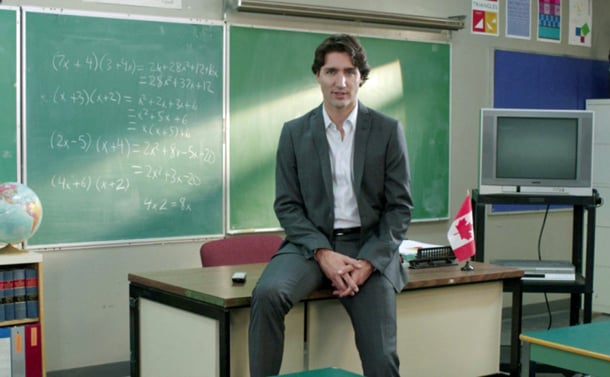Monique Bournot-Trites remembers Justin Trudeau already showing signs of leadership in his mid-twenties, back when he was one of her French immersion education students at the University of British Columbia.
"We have a French test that all the future French teachers have to take, and usually they are quite afraid of it, even the Francophones," said Bournot-Trites, an associate professor in the department of language and literacy education, who is Francophone herself and found the test intimidating.
The test involved role-playing with the examiner, something every one of Bournot-Trites' students dreaded. That is, until Trudeau took the test.
"It was the first time a student asked to stand up and do a role play. He took control of the test, and of course he did really well. It was surprising to us [professors] that he did that," she said.
Famously maligned in a Conservative party attack ad for his drama teacher credentials, Prime Minister-elect Justin Trudeau specialized in middle school French immersion in his one-year Bachelor of Education program at UBC from 1997 to '98.
That makes him Canada's second prime minister with front-of-classroom experience. Kim Campbell, who led for less than six months after Progressive Conservative Prime Minister Brian Mulroney stepped down in 1993, was the first.
So, how might Trudeau's teaching skills help him run Canada? While teaching experience doesn't necessarily make someone a good politician, good teachers possess many of the same talents as good leaders, said David Coulter, a UBC emeritus associate professor who researches educational leadership.
"There are some connections between the way we exercise political leadership in our society, and the kind of things that happen in the political arena of a classroom," he said.
Learning to work with others
After graduating from UBC in 1998, Trudeau taught on-call for the Vancouver School Board before landing a maternity leave fill-in from 1999 to 2001 at West Point Grey private school, where he taught high school French, humanities, drama, and elementary-level math. In 2002, he started an engineering program at l'École Polytechnique de Montréal, but never finished.
It was a short classroom career, but at UBC Trudeau was steeped in what Coulter describes as a democratic style of teaching, where teachers have ongoing conversations with their students about what's important for them to learn for their futures, as opposed to the "teacher knows best" model where students have no say in what, or how, they're taught.
The style encourages teachers to get to know their students and listen to what they have to say, said Bournot-Trites. "You have your objectives, but the activities you plan to reach your objective have to be interesting to the students. You have to know your students; they have to be engaged."
The ability to engage others is a quality of a good leader, too, Coulter said. Whether in the halls of schools or Parliament, good leaders work to start and sustain conversations about how people want to live together, he said. "It's about working with other people."
The best leaders also listen to what others want, which Trudeau at least appeared to do on the campaign trail, Bournot-Trites said.
"For example, when Trudeau said, '[Stephen] Harper is not afraid of me, he is afraid of you,' he was putting everything on the citizens. It was not him saying, 'I'm going to do this, I'm going to do that.' He was always saying, 'You want this, you want that.' And that's certainly something we teach in our program."
Leadership versus rulership
If political leadership is talking about the country Canadians want, then political rulership is about making the changes necessary to get there, Coulter said.
On its own, however, rulership can be negative. "Harper was really excellent at [rulership]," Coulter said. "The problem was, it wasn't legitimate, it was not democratic. He essentially became a ruler."
Like good teachers, politicians have to strike a balance between engaging people and getting things done -- between leadership and rulership, Coulter said. And it takes time to become good -- Coulter has taught for 45 years and said he's still improving.
Trudeau spent less than four years as a teacher, almost 15 years ago. But both Bournot-Trites and Coulter see in him the qualities of a good teacher -- at least from what they glimpsed on the campaign trail.
Whether Canada's new prime minister can take that teaching experience and translate it into good leadership remains to be seen. It's not a talent every teacher possesses, Coulter said.
"Some people can generalize from that, and some people can't," he said. "The same way some people take their classroom experience and put it into place when they become superintendents or principals, and some people can't. It's easy to slide into the rulership notion, and leave behind the leadership." ![]()
Read more: Politics, Education, Election 2015
















Tyee Commenting Guidelines
Comments that violate guidelines risk being deleted, and violations may result in a temporary or permanent user ban. Maintain the spirit of good conversation to stay in the discussion.
*Please note The Tyee is not a forum for spreading misinformation about COVID-19, denying its existence or minimizing its risk to public health.
Do:
Do not: